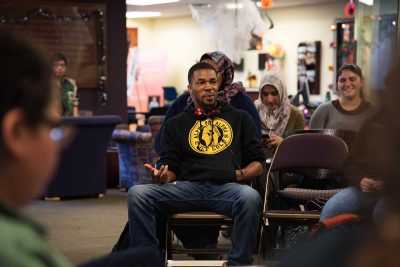
Inspired by a recent installment of The Common Thread Podcast, a program produced by undergraduate students at Boston University, approximately 30 students gathered at the Howard Thurman Center for Common Ground Friday to discuss the state of mental health on college campuses.
The Coffee and Conversation, hosted by the HTC, featured clinicians from BU’s Behavioral Medicine department to address students’ concerns regarding mental health.
The Common Thread team wrote in an email that this week’s conversation is necessary because mental health issues are prevalent on campus.
“[The] demand for therapeutic, psychological, and psychiatric services has dramatically escalated on college campuses nationwide in the past few years,” the team wrote prior to the event. “Students, for a variety of reasons [including] diminishing stigma, better diagnoses, improving medical science, heightened social and cultural emphasis on mental health, have been experiencing increased rates of mental health issues and mental disorders.”
The team wrote that the podcasts, as well as this event, are ways for students to talk openly with the administration about mental health issues.
“The disparity between existing available services and the demand for said services has created some frustration between students and university administrations,” the team wrote. “The purpose of this Coffee and Conversation is to explore the matter to help students better understand the nature of the problem and university officials to hear directly from the students they serve.”
BU Behavioral Medicine Director Carrie Landa and her associate Jennifer Durham-Fowler, along with students in the room, addressed a variety of topics related to mental health, ranging from the competitive nature of college students, the challenge to make new routines and to adapt to city life and social media’s crucial role in potentially harming someone’s mental health state.
Landa said students will often come in her office about “the exact same thing,” and she would suggest students to talk to their peers.
“I can guarantee you some of them are feeling something very similar,” she said. “Just last week, I had a student come back to me and say, ‘I took your advice and talked to my friends about it, and now we’re going to meet once a week and talk about how we’re struggling with this one class that we’re all taking.’ There’s support in each other.”

Most students, as the group explained, only post about the positive aspects of their life on social media. Therefore it can lead other students to have skewed perceptions of reality and adds to their stress.
Mae Lucey, a sophomore in the Sargent College of Health and Rehabilitation Sciences, said after the conversation that despite the pros of social media, sometimes it compels people to compete with one another for more likes.
“Social media is a way to make resources open, and it’s a way people can reach out,” Lucey said. “It starts a conversation, but it’s everyone’s best self. When people compare themselves, they feel their life is so much worse compared to what people are putting on social media. It definitely can help and hurt with people’s mental health.”
After the discussion, several students said mental health resources on campus are lacking, especially considering how widespread and important this issue is.
“It seems that the level of interaction [students] had with the administration didn’t live up with what they were promised when they applied to the school,” Mac Parker, a senior in the College of Arts and Sciences, said. “The administration puts itself in a position where they seem very pro-student and very supportive, [but] some of the people I talked to said it was hard to feel that that was true and they felt a sense of abandonment because of that.”
Lauren Banks, a sophomore in the College of General Studies, said students should be made more aware of the resources surrounding mental health at BU, especially during their freshman year when they are acclimating to college life and classes.
“I didn’t know about the resources at BU,” Banks said. “I knew enough [information], but it would benefit everyone if there were more. You can never have too much information about resources. It’s so much more important for people to seek out the help that they need than to be needing help and not know how to seek it.”





Thanks Cynthia! If you’d like to listen to the podcast series that went along with this conversation, you can listen at bucommonthread.com. We’re also on iTunes.